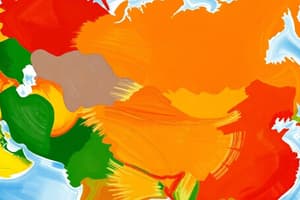Podcast
Questions and Answers
What is geography and what does it study?
What is geography and what does it study?
Geography is a field of science that studies the lands, features, inhabitants, and phenomena of Earth. It seeks to understand Earth and its complexities, including how objects have changed and come to be.
How is geography related to other scientific disciplines?
How is geography related to other scientific disciplines?
Geography is considered a bridge between natural science and social science disciplines.
Who is credited with the first recorded use of the word 'geography'?
Who is credited with the first recorded use of the word 'geography'?
Greek scholar Eratosthenes (276–194 BC).
What is the earliest known attempt at creating a world map?
What is the earliest known attempt at creating a world map?
Can the concepts of geography be applied to other celestial bodies?
Can the concepts of geography be applied to other celestial bodies?
Which continent is the largest in terms of land area and population?
Which continent is the largest in terms of land area and population?
What percentage of Earth's total land area does Asia cover?
What percentage of Earth's total land area does Asia cover?
Which ocean bounds Asia on the south?
Which ocean bounds Asia on the south?
Which continent shares the landmass of Eurasia with Asia?
Which continent shares the landmass of Eurasia with Asia?
Is there a clear physical and geographical separation between Asia and Europe?
Is there a clear physical and geographical separation between Asia and Europe?
Flashcards are hidden until you start studying
Study Notes
Understanding Geography
- Geography is the study of the Earth's landscapes, environments, and the relationships between people and their environments.
- Key areas of geography include physical geography (natural features) and human geography (cultural and societal aspects).
Interdisciplinary Nature of Geography
- Geography intersects with other scientific disciplines such as geology (Earth's structure), sociology (human behavior), and environmental science (ecosystem interactions).
- It utilizes tools from cartography, meteorology, and economics to analyze space and place.
Historical Origins
- Eratosthenes, a Greek scholar, is credited with the first recorded use of the word "geography" in the 3rd century BC.
Early Mapping Efforts
- The earliest known attempt at creating a world map was made by Anaximander, who depicted the known world in a circular format.
Application Beyond Earth
- Geographic concepts can be applied to other celestial bodies, providing insights into planetary features, atmospheres, and potential for life.
Asia: The Largest Continent
- Asia is the largest continent, accounting for the largest land area and population on Earth.
- Covers approximately 30% of Earth's total land area.
Oceanic Boundaries
- The Indian Ocean bounds Asia to the south, providing crucial maritime routes and ecological diversity.
Eurasian Landmass
- Europe shares the landmass of Eurasia with Asia, indicating a geographical continuum despite cultural differences.
Geographic Separation
- There is no distinct physical barrier separating Asia from Europe; the Ural Mountains and Caspian Sea serve as traditional boundaries, but they are geographically ambiguous.
Studying That Suits You
Use AI to generate personalized quizzes and flashcards to suit your learning preferences.




